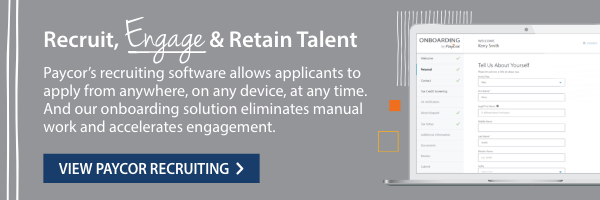Hiring new employees can be sort of like walking a tightrope. You’ve got to find the right candidates with the best qualifications for the job, but at the same time, you have to do some research on the background of your applicants so you can get a better idea of existing abilities, predicted on-the-job performance as well as character and integrity.
Additionally, many states require a criminal background check for anyone who works with children, the elderly, or people with disabilities. Failing to conduct a check on these employees could not only result in trouble at your business, but also fines or penalties, and damage to your company brand. Doing your due diligence by performing a pre-employment background check is simply no longer an option; it’s a necessity to business success.
What is a Pre-Employment Backgound Check?
A pre-employment background check is a process employers conduct to verify a candidate’s information and assess potential risks.It is conducted before an offer has been made to a candidate, and it is used to help companies make safe hiring decision. The background checks evaluate the following candidate information:
- Criminal history
- Employment
- Education
- Credit score
- Driving record
Which pre-employment screens are best for your organization?
When people think of background checks, basic criminal history reports come to mind. However, there are lots of different employment screens that you can run based on your needs. It’s also important to note that using a third-party service or background screening software built into an applicant tracking system is the most typical and easiest way to conduct background checks. In most instances the talent management software you use will include the appropriate legalese to get background check permission from each candidate, as well as track reasons for non-selection, which is important to help ensure compliance with EEOC regulations.
Types of Background Checks Employers Should Consider
The most common background checks for employers are criminal record searches. To run a criminal record search on your job applicants, you have several options to choose from:
- County Criminal History Search:County criminal history searches are the most common form of criminal background check. These searches allow employers to pull reports from court records of specific counties. Information that can be obtained from county criminal background checks includes the degree of the offense (felony, misdemeanor, infraction, etc.), the date of the offense, the disposition code, sentencing details, and other information regarding the case.
- National Criminal Database Search:The national criminal database search allows you to expand the scope of your criminal background check. Rather than only searching the counties or states where a candidate has lived and worked, the national criminal database search enables you to search databases from all 50 states, Washington D.C., Guam, and Puerto Rico.
- Federal Criminal Database Search:The federal criminal database search pulls records from all 94 U.S. federal courts and will return any violations of Federal laws. Federal violations include white-collar crimes, fraud, embezzlement, tax evasion, illegal sale of firearms, pornographic exploitation of children and so on. Because of the nature of these crimes, federal criminal background checks are often performed on C-level executives, CPAs, financial and banking staff, and other employees with access to financial information.

The HR Leader’s Guide to Recruiting & Hiring
To help you find new hires to help your company thrive, we’ve put together a comprehensive recruiting toolkit to help you get the job done.
Social Security Number Trace + Address History
The Social Security Number Trace and Address History search allows you to confirm that your candidate is who they say they are. The social security trace returns all of the names (including aliases) and addresses associated with a given SSN.
It is important to note that SSN trace findings are not part of the consumer report and the findings can’t be used as a basis for employment decisions. The SSN trace serves only to establish the true identity of a candidate and helps you to locate the jurisdictions where you should search for public records.
Education and Employer Verification
How certain can you be that a candidate has in fact accomplished everything that they claim? Education and Employer Verification checks allow you to be certain that your candidate “walks the walk.” Through education background checks, you can verify the dates that a candidate attended an institution, the majors that they studied, and the degrees that they earned. Employer background checks can be run to confirm employment history, unveiling information such as the dates of employment periods, titles held, and salary levels attained.
Social Media Background Check
In today’s climate, it is not uncommon to consider a doing social media background check, as your potential employees’ social media or online presence could attract attention to your business, for better or for worse. However, you’ll want to be sure you are conducting this in the most legitimate way possible. An appropriate social media background check requires a request from a third-party with explicit screening criteria (racism, sexually explicit content, illegal activity or violence); not using the human resources department to search all of the channels for a candidate’s name. Be very careful when adding this component; an out-of-compliance process could lead to claims of discrimination.
Other Common Background Checks for Employers:
- Professional License Verification
- Motor Vehicle Records Search
- Employment Credit Check
- Drug Screening: 5-Panel and 10-Panel Urine Tests
- Sex Offender List Search
- Domestic and Global Terrorist Watch List Searches
How do Most Employers Conduct Pre-Employment Background Checks?
Conducting a background check or pre-employment screening requires the handling of sensitive personal identifiable information (PII), which is why many companies use a legally compliant third party to conduct screenings. Background screening services or background check providers should be compliant with the Federal Trade Commission and the Fair Credit Reporting Act. If background checks are a part of your hiring process, you’ll want to be sure to have a privacy policy in place to share with the third party you employ, with job candidates or in the event of an audit.
Background Checks and the Law
Don’t forget that your applicants have legal rights that need to be adhered to. Some federal and state laws mandate that you can’t run a background check on potential employees without the applicant’s permission. While they’re done to protect the company, a proper background check also has to be measured with respect for the privacy of each applicant and stay within the parameters of compliance laws. For example, the Fair Credit Reporting Act or (FCRA) requires employers to have written consent before they check an applicant’s credit history. Additionally, any time you use an applicant’s background information to make an employment decision, you have to comply with federal laws that protect them from discrimination, including discrimination based on age, race, color, national origin, sex, religion, disability or genetic information. But you’ve got to make sure that you treat everyone equally.
How Paycor Helps
You need an Applicant Tracking System that keeps things simple. Paycor Recruiting integrates with leading background screening experts to keep your employees and your business safe. To learn more, contact one of our expert consultants today.

Do employers have to ask for permission before running a background check?
Yes. Under the Fair Credit Reporting Act (FCRA), employers must get written consent from the candidate before conducting a background check. Skipping this step can lead to legal consequences
Can an employer deny a job based on background check results?
Yes, but with caution. Employers must follow FCRA rules, including providing a pre-adverse action notice, the report used, and a chance for the candidate to respond before a final decision is made.
How far back do pre-employment background checks go?
This varies by state and the type of check. For example, criminal checks often go back 7 years, but some states allow longer reporting for certain convictions.
What’s the difference between a background check and a pre-employment screening?
“Screening” is a broader term that can include drug testing, skill assessments, and background checks. A background check specifically refers to verifying a candidate’s personal and professional history.









